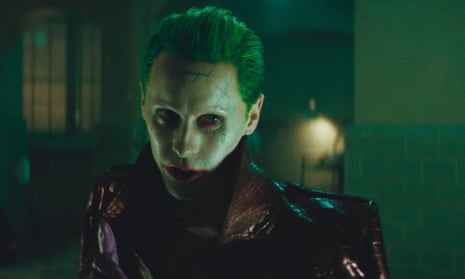Before Josh Brolin’s Thanos made such an impressive impact in this year’s Avengers: Infinity War, it used to be said that villains were the Marvel Cinematic Universe’s Achilles heel. Apart from Tom Hiddleston’s Loki and (in flashes) Cate Blanchett’s Hela, the bad guys of the MCU always seemed more thinly written than their valorous counterparts. Even Ultron, the ever-duplicating great robot big bad of the second Avengers movie, was never much more than a annoying digital thorn in the side of Earth’s mightiest heroes, while the less said about Christopher Eccleston’s Malekith or Mickey Rourke’s Whiplash the better.
It seems to have been criticism that Marvel has taken on the chin. The last three movies in the MCU have all boasted well-drawn antagonists with complex and believable motives, from the neo-Malthusian philosophy of Thanos, to the misguided proletarianism of Michael Keaton’s Vulture in Spider-Man: Homecoming, to the twisted Afrocentrism of Michael B Jordan’s Killmonger in Black Panther. It might come as some surprise, then, with Marvel having upped its bad-guy game, that it is Warner Bros’s rival DCEU mega-saga that looks to be rebuilding its shared movie universe around supervillains.
Variety reported recently that Jared Leto, whose performance as the Joker in the ill-faring Suicide Squad was left mostly on the cutting room floor, is (perhaps by way of apology, for goodness has the Oscar-winner moaned about his treatment) – to be treated to his very own movie by the Warner Bros bigwigs.
By the time that film reaches cinemas, we will probably have seen a completely different actor, Joaquin Phoenix, playing the same role in his own Joker solo outing. Might these two Jokers eventually meet and battle it out for the right to claim the mantle of true clown prince of Gotham? Sadly not (though this, surely, should be a chuckle-worthy plot strand of The Lego Batman Movie 2), for despite both of them being Warner creations, the pair are somehow destined never to find themselves within the same plane of movie-world existence. Leto-Joker will be the cackling green-haired sociopath of the interconnected DCEU, while Phoenix-Joker is trapped in his own standalone origins story. The main reason for the latter project’s existence seems to be to allow Warner to riff heavily off Martin Scorsese crime movies of the 1970s and 80s, while presumably pinching the more palatable elements of Alan Moore’s controversial cult graphic novel The Killing Joke.
The focus on villains is hardly a new concept for the DCEU. Warner chose to put the Dirty Dozen-style bad-guys-on-a-mission romp Suicide Squad into multiplexes before we had even seen more than the odd cameo by DC staples such as Wonder Woman or The Flash on the big screen. And there was a strong hint that we are due to see yet another supervillain teamup in the end credits scene for Justice League, with Jesse Eisenberg’s Lex Luthor asking Joe Manganiello’s Deathstroke whether they shouldn’t form “a league of our own” to counter Batman and Superman’s . Comic-book aficionados will remember that Slade Wilson was a founder member of Luthor’s Secret Society of Super Villains in the Infinite Crisis storyline.
It is probably safe to say that DC does have better – certainly better-known – bad guys than Marvel. And it is easy to see why Warner might have spotted a way to make itself stand out from its rival. The DCEU made headlines by becoming the first superhero mega-saga to debut a female-led episode, with the hugely successful Wonder Woman. So why not steal a march on Marvel once again by creating the first ever live-action supervillain flick? There have, after all, been plenty of similarly themed entries in animation, from the Despicable Me movies to Megamind.
Moreover, TV has already shown DC the way. Shows such as Breaking Bad and Fargo have made impressive capital out of showing a gradual descent into evil. The question is whether Warner can do the same over the course of a single movie, in the case of the Phoenix-Joker flick, and whether it can get away without showing us much character development in the case of the Leto-Joker episode. For surely both films cannot be origins : Leto-Joker will have to be presented as the fully formed, if thinly drawn, villain we met in Suicide Squad, and it will therefore surely be a challenge for audiences to care much about his nefarious antics when Batman is not around.

The other issue here is whether DC can be trusted when it comes to this new direction, for the studio’s approach to world-building thus far has often seemed so crippled by short-termism that it is tempting to wonder whether its executives have all had the vital parts of their brains zapped with a shrink ray as part of some devious Marvel plot. Manganiello’s Deathstroke was supposed to make his full debut in Ben Affleck’s The Batman – Affleck even tweeted some test footage in 2016. But that movie is now being directed by Matt Reeves, and may well not even star Affleck as the caped crusader at all following the departure this week of DC chief creative officer Geoff Johns. With Justice League flopping hard, it would not be a surprise if Luthor’s plans for a supervillain team were likewise quietly shelved, especially as Eisenberg is hardly invulnerable to future shakeups following his over-caffeinated turn in Batman v Superman: Dawn of Justice.
The contrast with Marvel, once again, is palpable. Few will remember Brolin’s CGI-heavy appearances as Thanos in early MCU episodes such as Guardians of the Galaxy, but in truth these helped sew the seeds for his catastrophic arrival on Earth in Infinity War. Like the mad Titan himself, studio boss Kevin Feige and his team had been setting up the events of the third Avengers movie for years, and even the lukewarm response to the supervillain’s early cameos failed to put them off. If Warner is banking on using bad guys to help the DC universe come good, it might do well to heed the lesson.

Comments (…)
Sign in or create your Guardian account to join the discussion